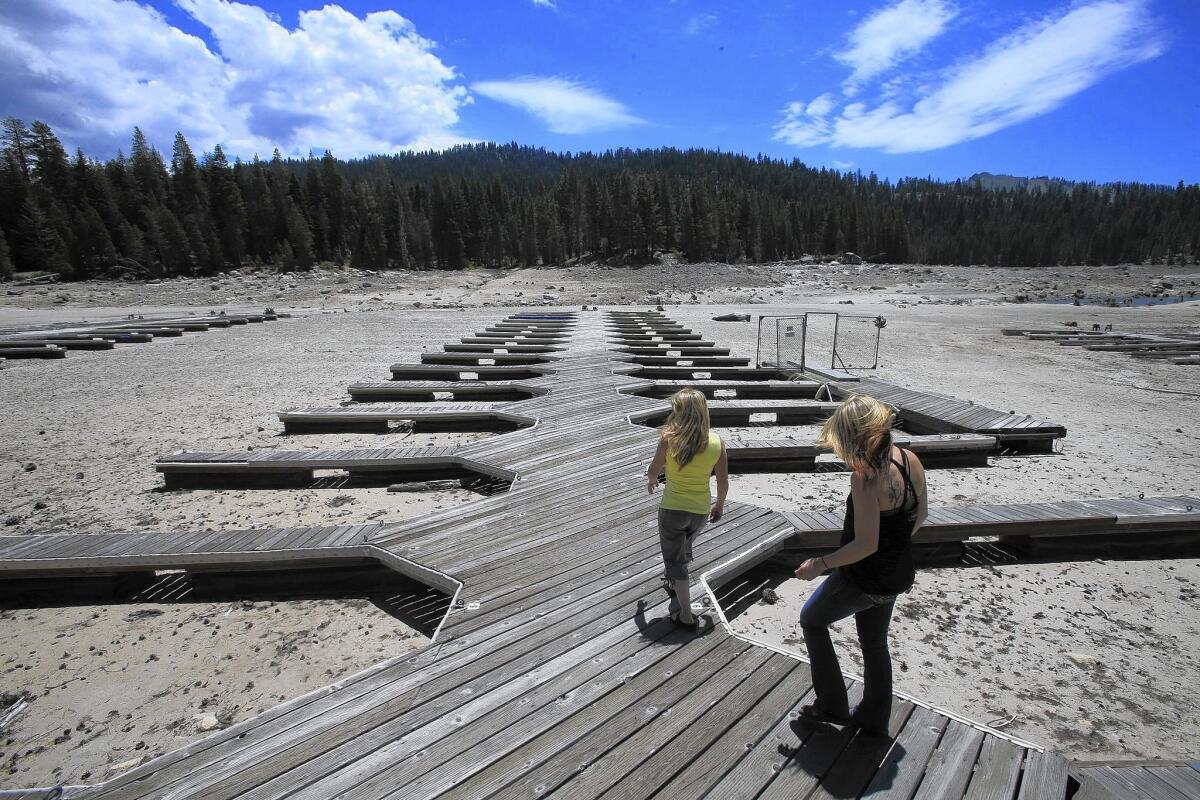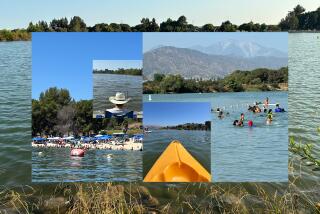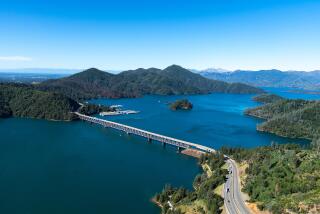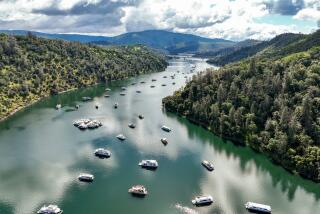Huntington Lake summer fun drying up in California drought

- Share via
Reporting from LAKESHORE, Calif. — The water dropped another 2 feet the week of Don Winters’ vacation.
Huntington Lake was at about a third of its normal level.
An island in the middle of the lake — a mini-hilltop of wildflowers that in other summers he’d paddled to in a canoe — was connected to shore by a bridge of land. It was a quick stroll from the new shoreline, now in the middle of where there used to be water.
But Winters, 65, never considered canceling his High Sierra vacation because of three years of California drought.
“This is the Golden Pond of my youth,” said the retired history teacher. “I used to come here with my grandfather.”
He would come hell or high water, he said, “or I guess you better make that ‘hell or no water.’”
The Sierra snowpack — which provides most of California’s drinking water — was at 32% of its average annual depth this winter. Now the state’s largest reservoirs are less than half-full.
The consequences of the drought are increasing: Many Central Valley farmers have no irrigation water. Migrant farmworker towns are packing up, emptying local schools. California’s delta waters are growing brackish because there has been little runoff from the mountains. The Central Valley is sinking as farmers pump more groundwater.
But none of the drought’s effects may hit home on as visceral a level as summer fun drying up.
The High Sierra Regatta — which had been scheduled to begin this weekend at Huntington Lake — was canceled for the first time in 60 years.
Usually, on two July weekends, this slow-paced mountain community becomes a jam-packed frenzy. Boats dart in and out of slips. Every lakeside rock becomes a seat, and the beach chairs are lined up as closely as on the Cannes seashore.
When there has been normal snowfall, the water almost spills out of the lake by July. The predictable, steady winds that make Huntington a premier sailing lake whip up whitecaps.
It is far quieter this year.
Just the fact that she had time to stop and chat was worth noting, said Elaine Newton, who owns Rancheria Marina with her sister and their husbands. She should be stocking ice and sodas and answering a dozen questions about the marina.
But their docks and moorings were piled up on the dirt — the same as at the other three resorts. Business was about half of what it would usually be this time of year.
The biggest difference to 18-year-old Ashleigh Newton, Elaine’s daughter who runs the marina’s store, was the view.
“I miss ... being able to walk outside and have the lake right there,” she said. “It seems so far away.”
It was a flat, blue dot in the distance — no water splashing against docks, only one tiny fishing boat on the entire lake.
Huntington is actually part of a system of three lakes, six dams and 43 miles of tunnels driven through granite. It drops water from the Sierra backcountry down 6,000 feet, where it is converted into electricity for Southern California.
The lake was created in 1912 and 1913 to fuel fast-growing Los Angeles, 300 miles to the south.
Come summer, that engineering feat is not what’s on the mind of visitors.
The water is deep blue, surrounded by firs and pine. There are no swank hotels — just cabins and old wooden docks. The air is cool, a welcome respite from the broiling Central Valley 70 miles to the west.
In April, when the Fresno Yacht Club sent out its “Attention West Coast Sailors” regatta cancellation notice, it included a picture showing the lake and a red dotted line marking the start and finish of the race — now on dry land.
It’s among a list of activities in the state canceled due to low water, including white water rafting trips and a Father Day’s fishing tournament at Castaic Lake.
Above Huntington Lake, there are smaller, natural lakes for those willing to hike a good distance. The water in those granite bowls is the same as it has been for endless summers. Each has only a small outlet. The wilderness water system moves more slowly than hydroelectric projects.
But even here, drought has wrought change.
Instead of scented pine needles underfoot, there is the dry crunch of kindling. At 8,000 feet, in July, there are usually snowflowers poking out of the last patches of white. No snow lingers. The red blooms are on dry ground this season.
Last summer, Huntington Lake and the surrounding area lost part of the summer tourism season to the 22,000-acre Aspen fire, which burned for 19 days. The campgrounds in these mountains were evacuated.
This year, summer vacations continue in long-worn traditions, with a few adaptations. The observation deck at the Dowville picnic area, instead of jutting into the lake, was now over land.
Sarah Davis, a Fresno County coroner, and her family walked from the popular spot to the island across Huntington’s new straits. They had run into only one other family in an entire day of strolling the lake.
“I can’t help looking at the lake and thinking about how it never rained for more than a day or two in the Central Valley this year,” she said. “But it’s still nice to be out of the heat.”
That morning, the potluck pancake breakfast at Lakeview Cottages had carried on the same as for at least 30 years.
Winters, the retired teacher who vowed he’d be at Huntington Lake every summer even should it dwindle to a stream, brought a huge platter of fresh-caught trout.
“You have the same amount of fish, but less water in the lake,” he exclaimed. “The fishing is great.”
He pointed out many things that were the same: hikes in cool mountain air, evening campfires, the friends one makes coming back to the same Sierra lake every summer.
The view was of where the lake used to be — a large, white beach and twisted rock formations with stripes that showed where the lake once hit.
It was a striking reminder of the drought. But even noting that was part of tradition, he said.
Summer at the lake is an escape. There are always worries waiting down the hill.
Twitter: @DianaMarcum
More to Read
Sign up for Essential California
The most important California stories and recommendations in your inbox every morning.
You may occasionally receive promotional content from the Los Angeles Times.














